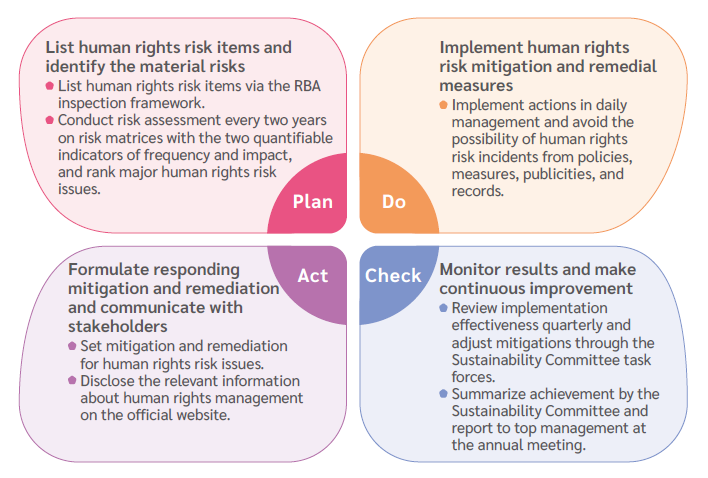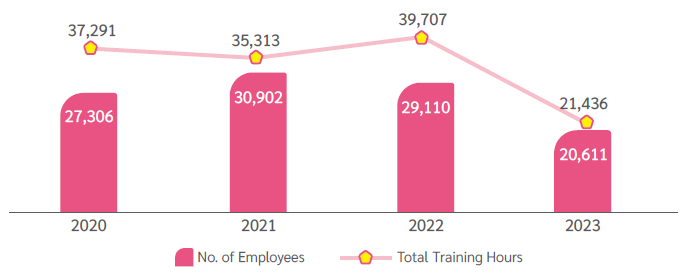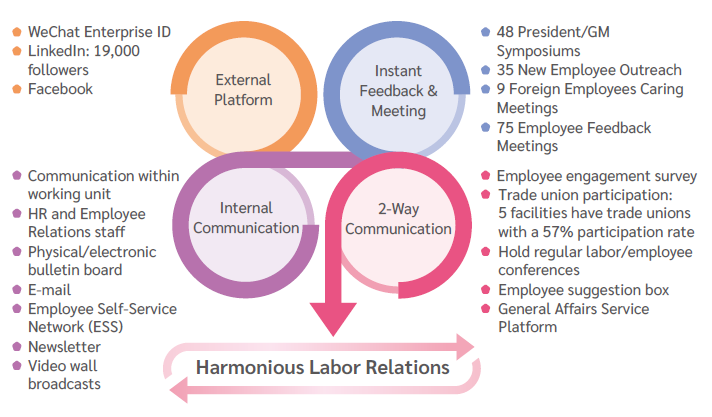
Inclusive Workplace
Human Rights
USI supports, respects, and is committed to human rights as defined in Principles 1 and 2 in the United Nations (UN) Global Compact, the Universal Declaration of Human Rights, the UN Guiding Principles on Business and Human Rights, the International Labor Organization's Declaration of Fundamental Principles and Rights at Work, the USI Code of Business Conduct and Ethics and the laws of the countries in which we operate. Being a member of the Responsible Business Alliance, we adopt its Code of Conduct in our global operations to enforce our commitment to protecting human rights.
Our commitment to enforcing human rights protection through these principles:
- Diversity and Anti-discrimination: We respect the diversity of our employees, suppliers, business partners, communities and all other stakeholders. We strictly prohibit any discrimination based on ethnicity, color, gender, gender identity, sexual orientation, marital status, language, age, nationality, religion, political affiliation, citizenship, ancestry, physical or mental disability, pregnancy, illness or any other characteristics protected by law.
- Respect and Humane Treatment: We are committed to treating people with respect and humanity. It is not tolerated to have any form of disrespectful or inappropriate behaviors in the workplace and work-related environment, including but not limited to sexual harassment, maltreatment, corporal punishment, mockery, insult, discrimination, hatred, derogation, threats, hostile behavior, interference, tracking, mental coercion, and aggression, etc.
- No Forced Labor and Human Trafficking: Being an employer and a global corporate citizen, we firmly forbid any type of forced labor, including human trafficking and illegal employment, and ensure all employment to be built upon the willingness, that means all employees have the right to choose or terminate the employment with the reasonable notice period in compliance with local laws.
- Child Labor and Young Workers: Any form of child labor is strictly prohibited. It is not allowed to employ worker s under the age of 16. And there is no tolerance to employ the young workers between the ages of 16 and 18 to perform any work that could jeopardize their health and safety, including night shifts and overtime.
- Compensation, Benefits and Working Hours: All relevant laws and regulations on salary, social security, working hours, etc. of the country or the jurisdiction where our operations are located are compliance with.
- Safety and Health in the Workplace: We are committed to providing our employees a safe and healthy work environment and striving for with zero injuries and accidents through complying with all applicable health and safety regulations and ensuring all procedures right in place.
- Freedom of Speech and Association: It is fully respected and supported that all employees have the right to freely associate and express their points of view. We are dedicated to build a trust and positive environment where employees can share their concerns or suggestions without fear of interference, intimidation, reprisal, discrimination, or harassment.
- Protection of Privacy: We recognize privacy, as a fundamental human right, shall be protected. Complying with the USI Privacy Policy, we strive for safeguarding personal data privacy and data security.
- Product Responsibility and Conflict-Free Minerals Commitment: We recognize the corporate responsibility for the products covers the entire life cycle from the raw materials used to their use and subsequent cycling. Keeping with USI conflict-free mineral procurement commitments, no metal or product from conflict minerals or areas that violate human rights is purchased or used on USI manufacturing and production. It is also not tolerated that USI products will be used for human rights violation.
Due Diligence
USI understands and manages human right issues in a responsible manner. Adhering to the concepts of PDCA management process and continuous improvement, the taskforce teams under the Sustainability Committee will identify, evaluate, monitor, prevent and reduce human rights impacts through the due diligence process.
RBA Risk Assessment Framework:
- USI’s human rights management focuses on our employees and suppliers' within its operations. Through the RBA management mechanism, we implement Self-Assessment Questionnaire (SAQ) internally every year and entrust external third-party institutions with special training in social and environmental audits to simultaneously provide RBA Validated Assessment Program (VAP) audit services for the risk management of all USI facilities and new business relationships. We conduct regular risk assessment with a two quantifiable indicators risk matrix: frequency and impact, to investigate risk assessment results in the past two years, identify issues and groups that are vulnerable to human rights risks, formulate measures and plans, and continue to make improvements. The survey results are compiled and submitted to the Sustainability Committee and reported to the top management through regular meetings.
- The joint venture human rights risk assessment is required to conduct human rights risk identification every year. Those human rights risk issues listed in their sustainability reports, or the SAQ human rights risk identification results are necessary to formulate corresponding improvement plans and track their mitigations.
- The supplier human right risk assessment is to conduct a human rights risk assessment on the annual Tier-1 suppliers and further understand which high risks that suppliers may face through on-site RBA VAP audits and continuously track and improve the effectiveness of their countermeasures for different risks.
RBA Human Rights Management Mechanism:
- In accordance with the RBA management framework, each facility implements regular internal and external audits. We arranges cross-site mutual audits every year to ensure full compliance with standards. If there are any non-compliant items, corrective actions must be proposed and completed within the requested period. The Sustainability Committee meets quarterly to review labor, environment, occupational health and safety, and ethics performance to ensure that the Company fulfills its various social responsibilities. We have established an investigation and employee reporting mechanisms and complaint channels to manage employees' complaints and ensure the implementation of human rights policies and avoid incidents that endanger human rights.
Due Diligence Process:

Human Rights Risk Mitigation & Remediation:
The results of the RBA SAQ and VAP human rights risk assessments carried out by the seven major factories and the statistics of employee complaint cases were used to identify the risks of each factory and propose corresponding mitigation plans. In 2023, the SAQ assessment scores of all facilities are higher than 85 points, indicating that all facilities are low-risk facilities in terms of human rights risks. Combining RBA VAP assessment and the employee complaint statistics, we found out that "working hours, wages and benefits, unlawful infringement, and sexual harassment" are issues that are prone to exposure risks. rom awareness training, management strengthening, to disciplinary actions, we have implemented mitigation measures and provided remediations.
USI continuously pays attention to human rights protection issues, promotes relevant training, and enhances human rights protection awareness to reduce the possibility of related risks. Every year, employees in all facilities are requested to take Employee Code of Conduct and Humane Treatment in the Workplace courses to know the definitions and requirements of pro behaviors. To strengthen employees' understanding of human rights issues, we have created some "microlearning" training videos for employees to learn during their fragmented time. In 2023, the per capita human right-related training was 1 hour; the total training hours were 21,436 hours; and the total number of trained employees was 20,611 (including resigned employees). 100% of employees have completed human rights training based on the training schedule.
Human Rights Training Participant Numbers and Training Hours:

USI’s human rights policies are implemented as follows:
Employee Rights: Build a workplace that is diverse and inclusive, free from discrimination and harassment, and has equal job opportunities
- USI complies with the employee human rights and labor laws in the country or jurisdiction where the Facility is located. All employees signed employment agreements with USI in compliance with local regulations (the signing rate is 100%). The agreement clearly stipulates the rights and obligations of both labor and the Company to protect and urges both parties to abide by it.
- Every Facility has Recruitment Guidelines that have defined standardized operating procedures to select the most suitable candidates who are willing to serve in USI without discrimination and difference to attract more diverse talents for USI.
- The "Policy of Workplace Humane Treatment Establishment" is to show a workplace culture of safety, dignity, nondiscrimination, mutual respect and tolerance, and equal opportunities, and to protect all employees from physical or mental harm while employees conduct their jobs.
Employee union: Respect employees’ freedom of association
- USI respects employees' freedom of association. Employees who have like-minded or interested partners can independently form associations. They are also free to organize and join trade unions and conduct collective consultations in accordance with relevant legal provisions. USI will not interfere in any way with the establishment, operation, or management of trade unions. USI will maintain smooth communication channels with the trade union, implement the matters related to employment, wage, and termination, and the regulations on employee health, safety, and sanitation, so that both labor and management can abide by them and form a labor union atmosphere for stable development. Now, except for the Nantou Facility and the Vietnam Facility, which have not established trade unions, the Zhangjiang Facility, Jinqiao Facility, Huizhou Facility, Kunshan Facility, and Mexico Facility have established their trade unions, and group agreements are signed with the trade unions. Employees participating in the trade union enjoy the protection of group agreements. The group agreement coverage rate is around 57% (Group agreement coverage rate = Number of trade union members / End-of-period number of employees in the Facility where the trade union had been established X100%). In 2023, with the Company's initiative-taking communication with employees, there was no strike, which resulted from major labor disputes or work stoppages.
| Unit | 2020 | 2021 | 2022 | 2023 | |
| No. of Employees in Unions | # | 5,900 | 6,350 | 5,901 | 6,887 |
| Join Unions Rate | % | 33.7 | 35.1 | 35.4 | 40.4 |
Employee communication: Establish a positive and harmonious labor-management relationship
- We actively establish a positive employee relationship and continuously maintain an open, mutual trust, and smooth one/two-way communication environment so that employees can instantly understand company trends and workplace-related rights and obligations and protect employee rights and interests. In addition, we arrange courses to introduce the channels for employees to express their opinions, the locations of Employee Suggestion Boxes, and how to fill in the relevant information. We listen to employees' voices by holding regular senior executive seminars, providing instant feedback meetings and channels, conducting questionnaires, and taking practical actions to promote harmony in labor-management relations. In 2023, there were 167 employee communication seminars in total and vigorously push and disseminate communication messages through various media and strengthen the promotion of information on internal and external reporting and feedback channels when the messages are conveyed. In 2023, there were 395 employee suggestions, and the corresponding units responded in the shortest time.



